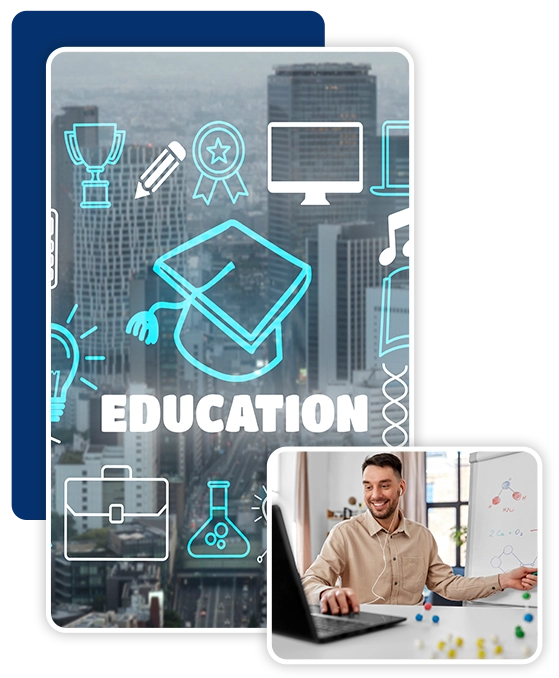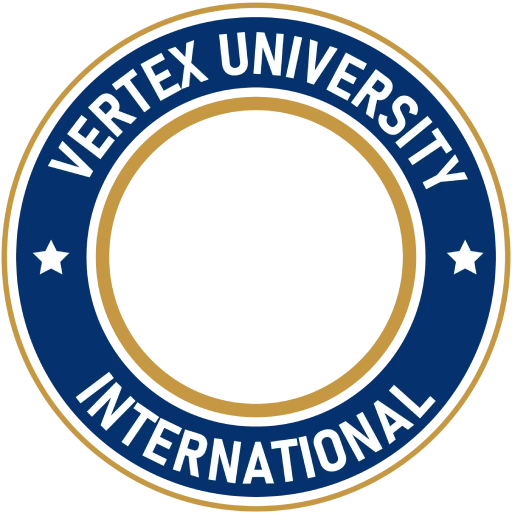Master METI Education Technology and Innovation
Improving digital education systems and developing e-learning environments has become a necessity to ensure high-quality and flexible education, in light of the rapid progress in educational technology and the evolution of e-learning methods. In this context, the Master of Education Technology and Innovation program at the Faculty of E-Learning at Vertex University offers an advanced academic curriculum that aims to provide students with innovative skills in educational technology, with a focus on improving teaching effectiveness and enhancing the educational experience using modern digital tools. The program provides a combination of in-depth academic knowledge and the latest technological innovations, helping students develop innovative educational solutions and drive change in the global education system.
The curriculum focuses on providing a comprehensive vision of the fields of e-learning and modern learning techniques. Students acquire advanced skills in developing digital learning content, analyzing student performance, and managing educational content using smart techniques. The program also provides advanced training in the use of learning management systems and educational technology applications to support the teaching and learning process. The program aims to qualify educational leaders who are able to develop innovative technological strategies to improve the quality of education and make the educational process more interactive and convenient.
The program focuses on enhancing practical experience by providing field training opportunities and case studies in the field of educational technology, where students can apply what they have learned in developing digital learning environments and applying best practices in designing digital curricula. It also sheds light on understanding the applications of educational technology at different academic and undergraduate levels, giving graduates the skills needed to manage and improve e-learning solutions in educational institutions. In addition, the program examines legal regulations related to educational technology to ensure the implementation of policies that govern the use of these tools in a safe and effective manner.
The Master of Educational Technology and Innovation program is taught by a distinguished academic team with extensive experience in the field of educational technology, ensuring that students receive a blend of modern theories and advanced practical applications. The program's learning environment also provides innovative educational tools, such as interactive simulations and specialized workshops, to train students to use digital learning techniques and analyze educational data. The program also offers opportunities to obtain internationally recognized degrees in advanced areas of educational technology, enhancing graduates' opportunities in the international job market.
The program offers its graduates various professional opportunities in the field of digital education. They can work in universities and schools to develop innovative educational solutions. They can also join educational technology companies, e-training institutions, or even establish their own projects in developing innovative educational tools. Thanks to this combination of academic and applied skills, graduates are ready to develop technological solutions that contribute to improving the educational process and making it more flexible and comprehensive.
Our Vision and Mission
Create the future of digital education by preparing academic leaders who are able to create smart educational solutions and achieve digital transformation in educational institutions in accordance with the highest international standards.
Our Vision
The Master of Educational Technology and Innovation program at Vertex University should be a pioneer in preparing academic leaders who are able to develop innovative educational systems and achieve sustainable digital transformation in educational institutions.
Our Mission
Qualifying specialists who combine creativity and technological knowledge to design innovative digital educational solutions and implement digital transformation strategies to improve the quality of education using the latest technologies.
- Develop students' skills in designing and implementing modern educational technology strategies.
- Enable graduates to improve the quality of education using digital tools and advanced technologies.
- Training students to effectively manage e-learning platforms to make the most of digital learning.
- Enhance the ability to use educational data to analyze performance and guide education strategies.
- Provide students with innovative skills in the use of information and communication technology in education.
- Enhance students' understanding of how to design digital educational content that fits the different needs of learners.
- Provide students with knowledge about smart learning methods and how to integrate them into traditional learning environments.
- Develop the ability to use virtual reality and augmented reality tools in designing innovative educational experiences.
- Provide students with the ability to manage digital educational projects and analyze their results.
- Teaching students how to develop technological solutions to contemporary educational challenges.
- To promote a deep understanding of the theoretical principles of educational technology and their application in practice.
- Provide students with the necessary skills to use artificial intelligence to improve the teaching and learning process.
- Enable students to use self-directed learning methods and interactive online lessons.
- Enhancing students' ability to develop innovative educational applications and software to support e-learning.
- Teach students how to improve the effectiveness of distance education and manage virtual classrooms.
- Provide students with the necessary knowledge to ensure the application of ethical policies in digital education and the protection of personal data.
Teaching methods and strategy

case studies
The realistic case study approach is integrated into the Master of Educational Technology and Innovation courses, where students are able to analyze real challenges in the field of e-learning and the use of technologies in different educational environments. The program focuses on evaluating the effectiveness of digital educational tools, analyzing student experiences on e-learning platforms, and applying technological solutions in designing educational content. It also provides students with the opportunity to develop innovative solutions to improve the digital learning experience, such as speeding up the interaction between teachers and students, promoting personalized education, and ensuring that educational content is accessible to the largest number of students, thus enhancing their analytical skills in digital education.

Scientific projects
The program attaches great importance to applied and research projects that combine theoretical concepts and modern techniques in educational technology. Students design innovative educational solutions using advanced technologies, such as artificial intelligence, educational data analysis, and virtual reality. Projects include analyzing the performance of e-learning platforms, developing innovative tools to enhance interaction in e-classrooms, and studying the impact of self-learning techniques on student achievement. Students also focus on designing educational solutions for different purposes such as blended learning, and customizing content based on students' different needs, thus enhancing their ability to deal with contemporary education challenges.

Teaching strategies
The Master of Educational Technology and Innovation program is based on flexible educational methods that integrate digital learning and research interaction. Academic content is delivered through live electronic lectures, interactive case study sessions, and analysis of real data from e-learning platforms. Students also participate in innovative educational workshops on the use of techniques such as artificial intelligence in education, simulation to design educational platforms, and analytical exercises related to improving the learning experience. The program focuses on developing critical thinking and decision-making based on the analysis of educational data, enabling students to use advanced technological tools in designing innovative solutions in the education sector.
What can you do with a Master's degree in Educational Technology and Innovation?
Educational institutions rely on specialists in educational technology and innovation to ensure improving the quality of the educational process, improving the learning experience, and ensuring the sustainability of digital educational systems. These specialists contribute to the application of modern technologies that make education more efficient and appropriate to the needs of students. Here are some jobs available to graduates of this program:
Lead educational innovation projects and design digital solutions that improve the learning experience.
- Digital educational content designer
- Director of E-learning Platforms
- Developer of innovative educational programs
- Instructional Technology Advisor for Educational Institutions
- An educational data analyst to improve student performance
Manage smart learning platforms and achieve sustainable and highly efficient digital learning environments.
- Project manager to develop smart learning solutions
- Developer of educational solutions using artificial intelligence
- Specialized in the automation of e-learning
- Training and content manager for distance education platforms
- E-learning quality officer and improving the learner experience
Get a consultation
Free now
Do you want to help?
+1 (984) 382-6080
Target group for the Master of Educational Technology and Innovation program

The Master of Educational Technology and Innovation program aims to provide students with the technological and creative skills needed to improve the learning experience, enhance the use of digital tools in education, and develop innovative learning strategies. This program is the ideal choice for the following ambitious categories:
- The Master of Education Technology and Innovation program targets new graduates with a bachelor's degree in education, information technology, and social sciences who want to develop their skills in using technology in education, designing digital content, and analyzing educational data.
- The program provides professionals working in schools, universities, and educational technology companies with an opportunity to expand their knowledge of educational technology applications, develop e-learning strategies, and analyze educational performance.
- The Master of Educational Technology and Innovation is an excellent choice for individuals who want to switch to digital education from other fields. By studying the use of technological tools in education, designing digital content, and managing e-learning platforms, they can build specialized expertise that helps them enter the education technology sector efficiently, opening many opportunities for them to develop innovative educational solutions and improve learning environments.
- The program targets emerging educational entrepreneurs who seek to develop innovative and scalable educational solutions. The Master provides entrepreneurs with in-depth knowledge in designing digital educational tools, educational planning, and strategies to improve interaction and online learning, helping them design advanced educational solutions that support innovation in digital education.
Enhance your professional skills with international certifications
This certification is offered to educational technology professionals who seek to develop their skills in using technological tools in education. It focuses on e-learning applications, digital content design, and educational data analysis. This certification is ideal for professionals who want to enhance their ability to design innovative digital learning environments.
This certification focuses on providing advanced skills in managing distance education and e-learning platforms. Recipients learn how to improve the online learning experience by designing interactive educational programs and employing the latest technologies such as artificial intelligence and augmented reality.
This certification aims to train students on how to develop and design innovative digital educational content. Recipients learn skills in using interactive software, educational videos, and digital simulation to create rich learning experiences that keep pace with the latest trends in educational technology.
This certification gives educational data analysis specialists the tools to extract strategic insights from data related to student academic performance. Those with this certification learn how to use advanced analysis tools to identify trends and improve educational outcomes.
This certification focuses on developing the management skills of e-learning systems. Topics learned include organizing online courses, and analyzing data to improve the educational process. Certification helps recipients manage and coordinate digital educational programs effectively.
This certification is ideal for professionals who focus on integrating traditional education and online learning. Recipients learn how to design flexible teaching strategies that use digital technologies to improve interaction and learning outcomes.
This certification is offered to individuals seeking to manage complex educational projects using educational technology. Recipients acquire advanced skills in managing digital educational projects by applying technological tools and analyzing performance to improve project implementation.
Admission Requirements
- Regular admission: the student applying for the graduate program must have a bachelor's degree from a reputable university or from the student's country.
- Applicants obtain a bachelor's degree in education, information technology, social sciences or any related discipline from an accredited university.
- English language proficiency if the language of instruction in the program is in English, with passing the approved language test.
- Conditional admission: The university may offer conditional admission to applicants until all admission requirements are met (terms and conditions for this category apply).
- Submit official documents including the original Bachelor's degree and transcript, along with true copies.
- Fill out the electronic application form through the admission and registration portal at the university.
- Pay the registration fees and tuition fees prescribed in accordance with the university regulations.
- Comply with the university's rules and regulations by signing an official pledge.
Required Documents
- A colored copy of the bachelor's degree issued by the student's country “Ministry of Higher Education”.
- A colored copy of the student's or family ID for matching.
- A colored copy of the student's passport.
- Personal photo (6*4) with a white background.
- Complete the registration data and sign it by the student.
Requirements for Obtaining Master in METI Education Technology and Innovation Specialization
| Number of Credit Hours Required to Complete the Master Degree | 33 Minimum Required Credit Hours |
|---|---|
| Number of Required Academic Semesters | 4 Academic Semesters |
| Number of Semesters per Year | 3 Semesters |
| Annual Credit Hours | 45 Credit Hour |
| Semester Duration | 8 to 10 weeks |
| Expected Duration to Complete the Program | 1 year and 18 months |
Advantages of this system.
- Complete the master's degree in a short time: the program can be completed in one and a half years instead of two or three years.
- Flexible distribution of materials: materials are distributed throughout the year, allowing continuous learning without long interruptions.
- An intensive schedule: allows you to finish school quickly and is suitable for students who want to enter the labor market as soon as possible.
*This system was designed at Vertex University to enable students to obtain their university degree in a shorter time while maintaining the quality of education and the efficiency of the academic process.

Want to get more information?
Register your details and we will contact you as soon as possible
Frequently Asked Questions about Master METI Education Technology and Innovation
Learning design focuses on building content, while educational techniques focus on tools and platforms, and blended learning focuses on integrating physical and digital learning.
Interactive and practical, including workshops, design projects, production of digital learning modules, and assessment of learning environments.
Yes, the programs are designed to be fully flexible, with recorded lectures and flexible weekly assignments.
Programs are designed according to the standards of organizations such as AECT and Quality Matters, and the college seeks specialized accreditations.
Bachelor's degree, a good level of English, a resume, and a letter of motivation.
Yes, like Adobe Captivate, Articulate Storyline, and Google Digital Education certifications.
The primary language is English, with explanatory support in Arabic in some courses.
